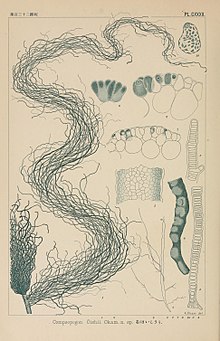Compsopogon
 From Wikipedia the free encyclopedia
From Wikipedia the free encyclopedia
| Compsopogon | |
|---|---|
 | |
| Compsopogon sp. | |
| Scientific classification | |
| (unranked): | |
| Division: | |
| Class: | |
| Order: | |
| Family: | Compsopogonaceae |
| Genus: | Compsopogon |
| Species: | C. caeruleus |
| Binomial name | |
| Compsopogon caeruleus (Balbis ex C.Agardh) Montagne | |
Compsopogon caeruleus, known as staghorn algae, is a species of red algae that lives in fresh water. It is a common nuisance in freshwater aquaria.[1] It is the only species in the genus Compsopogon and the only representative of the family Compsopogonaceae. It is found in North America, South America, Europe, Africa,[2] Asia, Australasia and Oceania. Compsopogon can tolerate a wide range of conditions in freshwater streams and occasionally in brackish lagoons and estuaries.[3] It propagates by asexual spores.
Compsopogon presents a thallus of simple cylindrical cells inside large covered cortical cells. In more mature and large thallus interior cells can be disintegrated, leaving only the outer cortex.
The species exhibits a wide phenotypic plasticity in studies such as field observations, with the result that historically many species have been described, when current thought treats it as a single species. There are two main morphologies in Compsopogon, one displaying regular cortical cells (morphology caeruleus), the other having cells with extra rhizoidals (morphology leptoclados).[4]
References
[edit]- ^ "Staghorn algae". Aquasabi. Retrieved 28 August 2024.
- ^ The genus was first published from smples taken in Algeria by J.F.C. Montagne in Flore d'Algérie (1846).
- ^ "Algaebase: Compsopogon Montagne 1846". Archived from the original on 2019-06-06. Retrieved 2019-11-13.
- ^ Joseph Seckbach; David J. Chapman (30 August 2010). Red Algae in the Genomic Age. Springer. pp. 113–. ISBN 978-90-481-3794-7. Retrieved 31 January 2011.